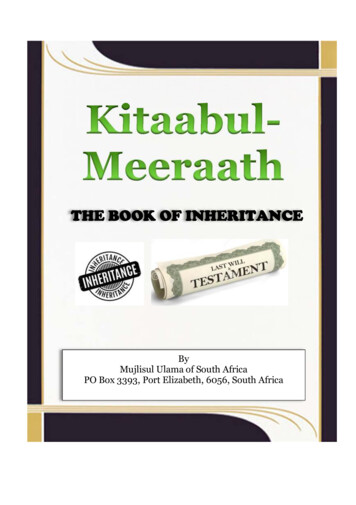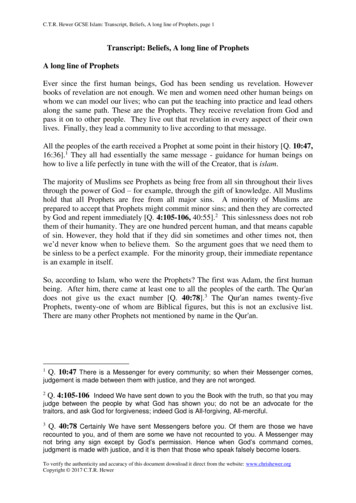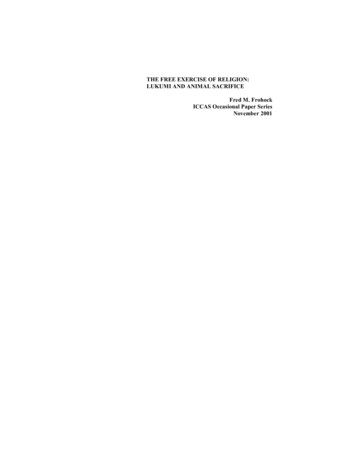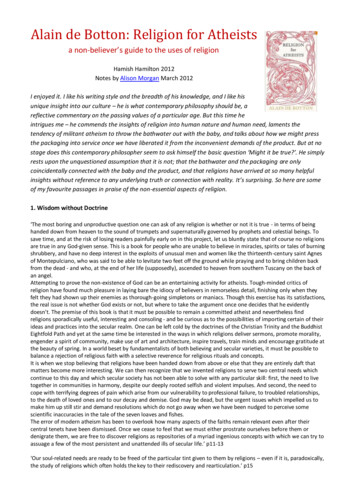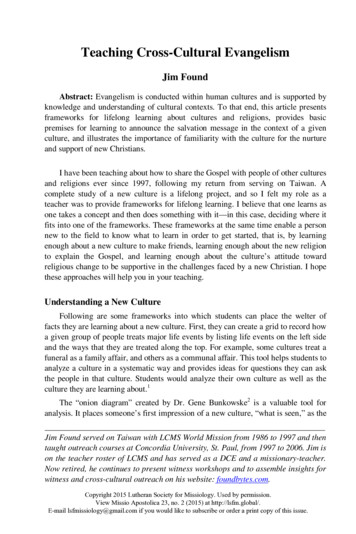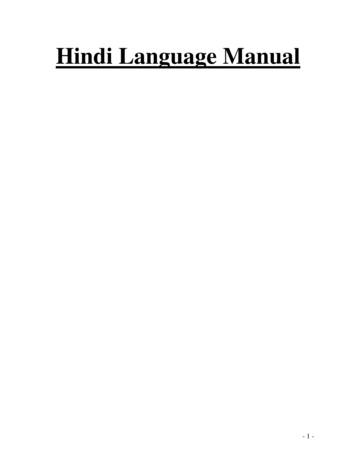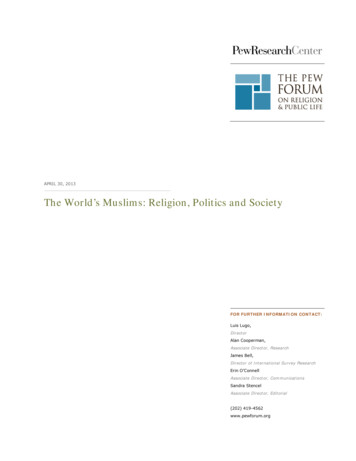
Transcription
APRIL 30, 2013The World’s Muslims: Religion, Politics and SocietyFOR FURTHER INFORMATION CONTACT:Luis Lugo,DirectorAlan Cooperman,Associate Director, ResearchJames Bell,Director of International Survey ResearchErin O’ConnellAssociate Director, CommunicationsSandra StencelAssociate Director, Editorial(202) 419-4562www.pewforum.org
2PEW RESEARCH CENTER’S FORUM ON RELIGION & PUBLIC LIFETHIS PAGE INTENTIONALLY BLANKwww.pewforum.org
3THE WORLD’S MUSLIMS: RELIGION, POLITICS AND SOCIETYAbout the Pew Research Center’s Forum on Religion & Public LifeThis report was produced by the Pew Research Center’s Forum on Religion & Public Life.The Pew Research Center is a nonprofit, nonpartisan “fact tank” that provides information onthe issues, attitudes and trends shaping America and the world. The center conducts publicopinion polling, demographic analysis and other data-driven social science research. It does nottake positions on policy issues. Its Forum on Religion & Public Life delivers timely, impartialinformation on the issues at the intersection of religion and public affairs in the U.S. and aroundthe world. The Pew Research Center is a subsidiary of The Pew Charitable Trusts, its primaryfunder.The report is a collaborative effort based on the input and analysis of the following individuals:Primary ResearcherJames Bell, Director of International Survey Research, Pew Research Center’s Forum onReligion & Public LifePew Research Center’s Forum on Religion & Public LifeLuis Lugo, DirectorResearchAlan Cooperman, Associate Director, ResearchNeha Sahgal, Senior ResearcherJessica Hamar Martinez, Besheer Mohamed, Michael Robbins and Katie Simmons, ResearchAssociatesNoble Kuriakose and Elizabeth P. Sciupac, Research AnalystsFatima Ghani, Research AssistantEditorialSandra Stencel, Associate Director, EditorialDiana Yoo, Graphic DesignerTracy Miller, Copy EditorMichael Lipka, Assistant Editorwww.pewforum.org
4PEW RESEARCH CENTER’S FORUM ON RELIGION & PUBLIC LIFECommunications and Web PublishingErin O’Connell, Associate Director, CommunicationsStacy Rosenberg, Digital Project ManagerLiga Plaveniece and Jemila Woodson, Communications AssociatesJoseph Liu, Web ProducerPew Research CenterAlan Murray, PresidentPaul Taylor, Executive Vice PresidentElizabeth Mueller Gross, Vice PresidentAndrew Kohut, Founding DirectorScott Keeter, Director of Survey ResearchJacob Poushter, Research Associate, Pew Research Center’s Global Attitudes ProjectCathy Barker, Research Assistant, Pew Research Center’s Global Attitudes ProjectVisit religion-politics-society.aspxto see the online version of the report.Pew Research Center’s Forum on Religion & Public Life1615 L St., NW, Suite 700Washington, D.C. 20036-5610Phone (202) 419-4550Fax (202) 419-4559www.pewforum.org 2013 Pew Research Centerwww.pewforum.org
5THE WORLD’S MUSLIMS: RELIGION, POLITICS AND SOCIETYTable of ContentsPAGEPreface7Executive Summary9Overview15Chapter 1: Beliefs About Sharia41Sharia as Divine Revelation42Interpreting Sharia44Sharia as the Official Law of the Land46Should Sharia Apply to All Citizens?48How Should Sharia Be Applied?50Views on Current Laws and Their Relation to Sharia57Chapter 2: Religion and Politics59Democracy60Religious Freedom62Religious Leaders’ Role in Politics64Islamic Political Parties66Concern About Religious Extremism68Suicide Bombing70Chapter 3: Morality73God and Morality74Beliefs About Morality76Morality and Marriage82Sharia, Morality and the Family87Beliefs About Family Honor89Chapter 4: Women in Society91Women and Veiling92www.pewforum.org
6PEW RESEARCH CENTER’S FORUM ON RELIGION & PUBLIC LIFEWives’ Role93Women and Divorce94Inheritance Rights for Women95Women’s Views on Women’s Rights97Sharia and Women’s Rights99Chapter 5: Relations Among Muslims101Perceived Levels of Devotion – Personal and Societal102Conflict Between More and Less Religious Muslims105Concern About Sunni-Shia Conflict107Chapter 6: Interfaith Relations109Islam and Eternal Salvation110Converting Others112Religious Conflict as a Big National Problem114Views of Muslim-Christian Hostilities116Familiarity with Other Faiths118Common Ground with Other Religions120Relationships with People of Other Faiths123Chapter 7: Religion, Science and Popular Culture127Religion and Modernity128Religion and Science130Evolution132Popular Culture134Impact on Morality136Appendix A: U.S. Muslims139Appendix B: Glossary145Appendix C: Survey Methodology147Appendix D: Topline159www.pewforum.org
7THE WORLD’S MUSLIMS: RELIGION, POLITICS AND SOCIETYPREFACEThis report examines the social and political views of Muslims around the world. It is based onpublic opinion surveys conducted by the Pew Research Center between 2008 and 2012 in atotal of 39 countries and territories on three continents: Africa, Asia and Europe. Together, thesurveys involved more than 38,000 face-to-face interviews in 80-plus languages and dialects,covering every country that has more than 10 million Muslims except for a handful (includingChina, India, Saudi Arabia and Syria) where political sensitivities or security concernsprevented opinion research among Muslims.Collecting and analyzing this trove of data was a massive endeavor, and the Pew ResearchCenter’s Forum on Religion & Public Life has published the results in stages. In August 2012,we released a report (“The World’s Muslims: Unity and Diversity”) that focused on the survey’sfindings about religious beliefs and practices. It showed that while there is much commonalityof belief among Muslims around the globe on some key tenets of their faith, there also aresubstantial differences in interpretation and levels of observance.Unity and diversity also emerge as important themes in this second report (“The World’sMuslims: Religion, Politics and Society”). Pew Research’s global survey of Muslims analyzesopinions on a wide range of topics, from Islamic law and science to popular culture and therole of women. It also looks at Muslims’ views on religious extremism and religious conflict intheir country. Finally, the report takes advantage of prior Pew Research surveys of Muslims inthe United States to compare the views of U.S. Muslims with the views of Muslims worldwide.The global survey of Muslims was conducted in two waves. Fifteen sub-Saharan Africancountries with substantial Muslim populations were surveyed in 2008-2009, and some ofthose findings previously were analyzed in the report “Tolerance and Tension: Islam andChristianity in Sub-Saharan Africa.” An additional 24 countries in Africa, Asia, the Middle Eastand Europe were surveyed in 2011-2012; results from all 39 countries are analyzed here as wellas in the August 2012 report on Muslims’ religious beliefs and practices.Pew Research’s global survey of Muslims is part of a larger effort, the Pew-Templeton GlobalReligious Futures project, which analyzes religious change and its impact on societies aroundthe world. Recent studies produced under the Pew-Templeton initiative, jointly funded by ThePew Charitable Trusts and the John Templeton Foundation, include “The Global ReligiousLandscape: A Report on the Size and Distribution of the World’s Major Religious Groups as of2010” (December 2012), “Rising Tide of Restrictions on Religion” (September 2012), “Faith onthe Move: The Religious Affiliation of International Migrants” (March 2012), “Globalwww.pewforum.org
8PEW RESEARCH CENTER’S FORUM ON RELIGION & PUBLIC LIFEChristianity: A Report on the Size and Distribution of the World’s Christian Population”(December 2011) and “The Future of the Global Muslim Population: Projections for 20102030” (January 2011).With the release of this report, we also are launching a new website for the Pew-TempletonGlobal Religious Futures project that allows people to explore demographic data and surveyresults on religion in many countries around the world.The primary researcher for “The World’s Muslims: Religion, Politics and Society” was JamesBell, the director of international survey research for the Pew Research Center. He receivedvaluable assistance from Senior Researcher Neha Sahgal, Research Associates MichaelRobbins and Katie Simmons, and others listed on the masthead of this report. Leah Christian,formerly a senior researcher at the Pew Research Center, also contributed to the project.Fieldwork was carried out under the direction of Princeton Survey Research AssociatesInternational and Opinion Research Business; we particularly wish to thank Mary McIntoshand Jonathan Best of PSRAI and Johnny Heald and Cara Carter at ORB.Amaney Jamal, Associate Professor of Politics at Princeton University, served as a specialadviser. In the design of the survey questions and the preparation of this report, the PewResearch Center also was fortunate to be able to call on the expertise of several other academicexperts, including Asma Afsaruddin of Indiana University, Xavier Bougarel of The NationalCentre for Scientific Research (Paris), Michael Cook of Princeton University, David Damrel ofthe University of South Carolina, Nile Green of the University of California, Los Angeles,Robert Hefner of Boston University, Marcia Hermansen of Loyola University Chicago, LeonardLewisohn of the University of Exeter (United Kingdom), Peter Mandaville of George MasonUniversity, Vali Nasr of The Johns Hopkins University, Stephen Prothero of Boston University,Asifa Quraishi of the University of Wisconsin Law School, Farid Senzai of Santa ClaraUniversity and Shibley Telhami of the University of Maryland.While the survey design was guided by the counsel of our advisers, contractors andconsultants, the Pew Research Center is solely responsible for the interpretation and reportingof the data.Luis Lugo, DirectorAlan Cooperman, Associate Director for Researchwww.pewforum.org
9THE WORLD’S MUSLIMS: RELIGION, POLITICS AND SOCIETYEXECUTIVE SUMMARYA new Pew Research Center survey of Muslims around the globe finds that most adherents ofthe world’s second-largest religion are deeply committed to their faith and want its teachingsto shape not only their personal lives but also their societies and politics. In all but a handful ofthe 39 countries surveyed, a majority of Muslims say that Islam is the one true faith leading toeternal life in heaven and that belief in God is necessary to be a moral person. Many also thinkthat their religious leaders should have at least some influence over political matters. Andmany express a desire for sharia – traditional Islamic law – to be recognized as the official lawof their country.The percentage of Muslims who say they want sharia to be “the official law of the land” varieswidely around the world, from fewer than one-in-ten in Azerbaijan (8%) to near unanimity inAfghanistan (99%). But solid majorities in most of the countries surveyed across the MiddleEast and North Africa, sub-Saharan Africa, South Asia and Southeast Asia favor theestablishment of sharia, including 71% of Muslims in Nigeria, 72% in Indonesia, 74% in Egyptand 89% in the Palestinian territories.At the same time, the survey finds that even in many countries where there is strong backingfor sharia, most Muslims favor religious freedom for people of other faiths. In Pakistan, forexample, three-quarters of Muslims say that non-Muslims are very free to practice theirreligion, and fully 96% of those who share this assessment say it is “a good thing.” Yet 84% ofPakistani Muslims favor enshrining sharia as official law. These seemingly divergent views arepossible partly because most supporters of sharia in Pakistan – as in many other countries –think Islamic law should apply only to Muslims. Moreover, Muslims around the globe havediffering understandings of what sharia means in practice.The survey – which involved more than 38,000 face-to-face interviews in 80-plus languageswith Muslims across Europe, Asia, the Middle East and Africa – shows that Muslims tend to bemost comfortable with using sharia in the domestic sphere, to settle family or propertydisputes. In most countries surveyed, there is considerably less support for severepunishments, such as cutting off the hands of thieves or executing people who convert fromIslam to another faith. And even in the domestic sphere, Muslims differ widely on suchquestions as whether polygamy, divorce and family planning are morally acceptable andwhether daughters should be able to receive the same inheritance as sons.In most countries surveyed, majorities of Muslim women as well as men agree that a wife isalways obliged to obey her husband. Indeed, more than nine-in-ten Muslims in Iraq (92%),www.pewforum.org
10PEW RESEARCH CENTER’S FORUM ON RELIGION & PUBLIC LIFEMorocco (92%), Tunisia (93%), Indonesia (93%), Afghanistan (94%) and Malaysia (96%)express this view. At the same time, majorities in many countries surveyed say a womanshould be able to decide for herself whether to wear a veil.Overall, the survey finds that most Muslims see no inherent tension between being religiouslydevout and living in a modern society. Nor do they see any conflict between religion andscience. Many favor democracy over authoritarian rule, believe that humans and other livingthings have evolved over time and say they personally enjoy Western movies, music andtelevision – even though most think Western popular culture undermines public morality.The new survey also allows some comparisons with prior Pew Research Center surveys ofMuslims in the United States. Like most Muslims worldwide, U.S. Muslims generally expressstrong commitment to their faith and tend not to see an inherent conflict between beingdevout and living in a modern society. But American Muslims are much more likely thanMuslims in other countries to have close friends who do not share their faith, and they aremuch more open to the idea that many religions – not only Islam – can lead to eternal life inheaven. At the same time, U.S. Muslims are less inclined than their co-religionists around theglobe to believe in evolution; on this subject, they are closer to U.S. Christians.Few U.S. Muslims voice support for suicide bombing or other forms of violence against civiliansin the name of Islam; 81% say such acts are never justified, while fewer than one-in-ten sayviolence against civilians either is often justified (1%) or is sometimes justified (7%) to defendIslam. Around the world, most Muslims also reject suicide bombing and other attacks againstcivilians. However, substantial minorities in several countries say such acts of violence are atleast sometimes justified, including 26% of Muslims in Bangladesh, 29% in Egypt, 39% inAfghanistan and 40% in the Palestinian territories.These are among the key findings of a worldwide survey by the Pew Research Center’s Forumon Religion & Public Life. The survey was conducted in two waves. Fifteen sub-SaharanAfrican countries with substantial Muslim populations were surveyed in 2008-2009, and someof those results previously were analyzed in the Pew Research Center’s 2010 report “Toleranceand Tension: Islam and Christianity in Sub-Saharan Africa.” An additional 24 countries inEurope, Asia, the Middle East and Africa were surveyed in 2011-2012; results regardingreligious beliefs and practices were first published in the Pew Research Center’s 2012 report“The World’s Muslims: Unity and Diversity.” The current report focuses on Muslims’ socialand political attitudes, and it incorporates findings from both waves of the survey.www.pewforum.org
11THE WORLD’S MUSLIMS: RELIGION, POLITICS AND SOCIETYOther key findings include: At least half of Muslims in most countries surveyed say they are concerned aboutreligious extremist groups in their country, including two-thirds or more of Muslims inEgypt (67%), Tunisia (67%), Iraq (68%), Guinea Bissau (72%) and Indonesia (78%). Onbalance, more are worried about Islamic extremists than about Christian extremists. Muslims around the world overwhelmingly view certain behaviors – includingprostitution, homosexuality, suicide, abortion, euthanasia and consumption of alcohol –as immoral. But attitudes toward polygamy, divorce and birth control are more varied.For example, polygamy is seen as morally acceptable by just 4% of Muslims in BosniaHerzegovina and Azerbaijan; about half of Muslims in the Palestinian territories (48%)and Malaysia (49%); and the vast majority of Muslims in several countries in subSaharan Africa, such as Senegal (86%) and Niger (87%). In most countries where a question about so-called “honor” killings was asked,majorities of Muslims say such killings are never justified. Only in two countries –Afghanistan and Iraq – do majorities condone extra-judicial executions of women whoallegedly have shamed their families by engaging in premarital sex or adultery. Relatively few Muslims say that tensions between more religiously observant and lessobservant Muslims are a very big problem in their country. In most countries where thequestion was asked, Muslims also see little tension between members of Islam’s twomajor sects, Sunnis and Shias – though a third or more of Muslims in Pakistan (34%)and Lebanon (38%) consider Sunni-Shia conflict to be a very big problem. Muslims in sub-Saharan Africa are more likely than Muslims surveyed in other regionsto say they attend interfaith meetings and are knowledgeable about other faiths. Butsubstantial percentages of Muslims in sub-Saharan Africa also perceive hostilitybetween Muslims and Christians. In Guinea-Bissau, for example, 41% of Muslims say“most” or “many” Christians are hostile toward Muslims, and 49% say “most” or “many”Muslims are hostile toward Christians. In half of the countries where the question was asked, majorities of Muslims wantreligious leaders to have at least “some influence” in political matters, and sizableminorities in Asia, the Middle East and North Africa think religious leaders should havea lot of political influence. For example, 37% of Muslims in Jordan, 41% in Malaysia and53% in Afghanistan say religious leaders should play a “large” role in politics.www.pewforum.org
12PEW RESEARCH CENTER’S FORUM ON RELIGION & PUBLIC LIFE Support for making sharia the official law of the land tends to be higher in countries likePakistan (84%) and Morocco (83%) where the constitution or basic laws favor Islamover other religions. In many countries, Muslims who pray several times a day are more likely to supportmaking sharia official law than are Muslims who pray less frequently. In Russia,Lebanon, the Palestinian territories and Tunisia, for example, Muslims who pray severaltimes a day are at least 25 percentage points more supportive of enshrining sharia thanare less observant Muslims. Generally, however, there is little difference in support forsharia by age, gender or education.www.pewforum.org
13THE WORLD’S MUSLIMS: RELIGION, POLITICS AND SOCIETYCountries SurveyedThe survey in Thailand was conducted only among Muslims in five southern provinces: Narathiwat, Pattani, Satun, Songkhla andYala. It is representative of Muslims in these five provinces.PEW RESEARCH CENTERwww.pewforum.org
14PEW RESEARCH CENTER’S FORUM ON RELIGION & PUBLIC LIFETHIS PAGE INTENTIONALLY BLANKwww.pewforum.org
15THE WORLD’S MUSLIMS: RELIGION, POLITICS AND SOCIETYOVERVIEWOverwhelming percentages of Muslims inmany countries want Islamic law (sharia) to bethe official law of the land, according to aworldwide survey by the Pew Research Center.But many supporters of sharia say it shouldapply only to their country’s Muslimpopulation.Moreover, Muslims are not equallycomfortable with all aspects of sharia: Whilemost favor using religious law in family andproperty disputes, fewer support theapplication of severe punishments – such aswhippings or cutting off hands – in criminalcases. The survey also shows that Muslimsdiffer widely in how they interpret certainaspects of sharia, including whether divorceand family planning are morally acceptable.The survey involved a total of more than38,000 face-to-face interviews in 80-pluslanguages. It covered Muslims in 39 countries,which are divided into six regions in this report– Southern and Eastern Europe (Russia andthe Balkans), Central Asia, Southeast Asia,South Asia, the Middle East and North Africa,and sub-Saharan Africa.Support for Sharia% of Muslims who favor making sharia theofficial law in their nd inian DR SenegalCameroonLiberiaChadGuinea BissauTanzaniaSouthern-Eastern Europe42201512Central Asia121083527Southeast Asia7772South Asia86998482Middle East-North Africa29567471918983Sub-Saharan Africa*37868274716665656463585553524747*Data for all countries except Niger from “Tolerance andTension: Islam and Christianity in Sub-Saharan Africa.” Interviews conducted with Muslims in five southernprovinces only.**Question was modified to ask if sharia should be the lawof the land in Muslim areas.This question was not asked in Uzbekistan.PEW RESEARCH CENTER Q79a.www.pewforum.org
16PEW RESEARCH CENTER’S FORUM ON RELIGION & PUBLIC LIFERegional DifferencesMany Back Sharia as Official LawAttitudes toward Islamic law vary significantlyby region. Support for making sharia the law ofthe land is highest in South Asia (median of84%). Medians of at least six-in-ten Muslims insub-Saharan Africa (64%), the Middle EastNorth Africa region (74%) and Southeast Asia(77%) also favor enshrining sharia as officiallaw. But in two regions, far fewer Muslims sayIslamic law should be endorsed by theirgovernments: Southern and Eastern Europe(18%) and Central Asia (12%).Median % of Muslims who favor enshriningshariaSouth Asia84Southeast AsiaMiddle EastNorth AfricaSub-SaharanAfrica*SouthernEastern EuropeCentral Asia7774641812*Data for all countries except Niger from “Tolerance andTension: Islam and Christianity in Sub-Saharan Africa.”PEW RESEARCH CENTER Q79a.Within regions, support for enshrining shariaas official law is particularly high in somecountries with predominantly Muslim populations, such as Afghanistan and Iraq. 1 But supportfor sharia is not limited to countries where Muslims make up a majority of the population. Insub-Saharan Africa, for example, Muslims constitute less than a fifth of the population inCameroon, the Democratic Republic of the Congo, Ghana, Kenya, Liberia, Mozambique andUganda; yet in each of these countries, at least half of Muslims (52%-74%) say they want shariato be the official law of the land.Conversely, in some countries where Muslims make up more than 90% of the population,relatively few want their government to codify Islamic law; this is the case in Tajikistan (27%),Turkey (12%) and Azerbaijan (8%).1The populations of both Afghanistan and Iraq are at least 99% Muslim. Estimates for the religious composition of countries inthis report are from the Pew Research Center’s December 2012 report “The Global Religious Landscape.”www.pewforum.org
17THE WORLD’S MUSLIMS: RELIGION, POLITICS AND SOCIETYDistinct legal and political cultures may helpto explain the differing levels of support forsharia. Many of the countries surveyed inCentral Asia and Southern and EasternEurope share a history of separating religionand the state. The policies of modern Turkey’sfounding father, Mustafa Kemal Ataturk, forexample, emphasized the creation of a seculargovernment; other countries in these tworegions experienced decades of secularizationunder communist rule. By contrast,governments in many of the countriessurveyed in South Asia and the Middle EastNorth Africa region have officially embracedIslam.ShariaSharia, or Islamic law, offers moraland legal guidance for nearly allaspects of life – from marriage anddivorce, to inheritance and contracts,to criminal punishments. Sharia, inits broadest definition, refers to theethical principles set down in Islam’sholy book (the Quran) and examplesof actions by the ProphetMuhammad (sunna). The Islamicjurisprudence that comes out of thehuman exercise of codifying andinterpreting these principles isknown as fiqh. Muslim scholars andjurists continue to debate theboundary between sharia and fiqh aswell as other aspects of Islamic law.www.pewforum.org
18PEW RESEARCH CENTER’S FORUM ON RELIGION & PUBLIC LIFEExisting Legal FrameworksIndeed, the survey finds that support formaking sharia the law of the land is oftenhigher in countries where the constitutionor basic laws already favor Islam over otherreligions. 2 Majorities in such countries saysharia should be enshrined as official law,including at least nine-in-ten Muslims inAfghanistan (99%) and Iraq (91%). Bycomparison, in countries where Islam isnot legally favored, roughly a third or fewerMuslims say sharia should be the law of theland. Support is especially low inKazakhstan (10%) and Azerbaijan (8%). 3Higher Support for Sharia WhereIslam Is Officially Favored Religion% of Muslims who say sharia shouldbe official law In countries where Islam is the officiallyfavored religionAfghanistan99Iraq91Palestinian ypt74Indonesia72Jordan71Tunisia56In countries where Islam is not theofficially favored Bosnia-Herz.AlbaniaTurkeyKazakhstanAzerbaijan2The designation “officially favored religion” is based onthe Pew Research Center’s September 2012 report “RisingTide of Restrictions on Religion.” See 2010 data forquestion in Government Restrictions Index on whether acountry’s constitution or basic law recognizes a favoredreligion (GRI.Q.20.1). For analysis of support for shariaamong Muslims in sub-Saharan Africa, see the PewResearch Center’s April 2010 report “Tolerance andTension: Islam and Christianity in Sub-Saharan Africa.”151212108* Lebanon has 18 favored religious sects, both Islamic and nonIslamic.This question was not asked in Uzbekistan. Russia and Thailandare excluded since the question was modified to ask if shariashould be the law of the land in Muslim areas. (See Chapter 1 formore details.)Data on government favoritism of Islam is from the Pew ResearchCenter’s September 2012 report “Rising Tide of Restrictions onReligion” (GRI.Q.20.1).PEW RESEARCH CENTER Q79a.3Whether a country’s legal system shapes, or is shaped by,public opinion is beyond the scope of this study. This reportis not asserting a causal relationship in either direction.www.pewforum.org
19THE WORLD’S MUSLIMS: RELIGION, POLITICS AND SOCIETYThe survey also finds that views about institutingsharia in the domestic-civil sphere frequentlymirror a country’s existing legal system. Askedwhether religious judges should decide family andproperty disputes, at least half of Muslims living incountries that have religious family courts answeryes. 4 By contrast, in countries where secular courtsoversee family matters, fewer than half of Muslimsthink that family and property disputes should bewithin the purview of religious judges.When comparing Muslim attitudes toward shariaas official law and its specific application in thedomestic sphere, three countries are particularlyinstructive: Lebanon, Tunisia and Turkey.In Lebanon, Islam is not the favored religion of thestate, but the major Muslim sects in the countryoperate their own courts overseeing family law. 5Attitudes of Lebanese Muslims appear to mirrorthis political and legal structure: While roughlythree-in-ten (29%) say sharia should be the officiallaw of the land, about half (53%) say religiousjudges should have the power to decide family andproperty disputes.Support for Religious CourtsMirrors Existing Legal System% of Muslims who say religious judges shouldhave power to decide family law and propertydisputes In countries with religious courts for family an 16653In countries with secular courts for family s question was not asked in Uzbekistan. Russia andThailand are excluded since a modified version of thequestion was asked in these countries.PEW RESEARCH CENTER Q92a.4Information on countries that have religious family courts is from Stahnke, Tad and Robert C. Blitt. 2005. “The Religion-StateRelationship and the Right to Freedom of Religion or Belief: A Comparative Textual Analysis of the Constitutions of PredominantlyMuslim Countries.” Georgetown Journal of International Law, volume 36, issue 4; Emory Law School’s Islamic Family Law project,http://www.law.emory.edu/ifl/; and University of Richmond’s Constitution Finder, http://confinder.richmond.edu/.5See National Reconciliation Charter of Lebanon. 1989. Articles 1b and1j; and Abiad, Nisrine. 2008. “Sharia, Muslim States andInternational Human Rights Treaty Obligations: A Comparative Study.” British Institute of International and Comparative Law,page 56.www.pewforum.org
20PEW RESEARCH CENTER’S FORUM ON RELIGION & PUBLIC LIFETunisia’s legal framework is, in key respects, the opposite of Lebanon’s: The TunisianConstitution favors Islam over other religions, but religious courts, which once governedfamily law, were abolished in 1956. 6 Perhaps reflecting this history, more than half of TunisianMuslims (56%) want sharia to be the official law of the land, but a minority (42%) saysreligious courts should oversee family and property law.Turkey’s evolution in the early 20th century included sweeping legal reforms resulting in asecular constitution and legal framework. As part of these changes, traditional sharia courts wereeliminated in the 1920s. 7 Today, only minorities of Turkish Muslims back enshrining sharia asofficial law (12%) or letting religious judges decide family and property disputes (14%).6See Constitution
THE WORLD’S MUSLIMS: RELIGION, POLITICS AND SOCIETY . www.pewforum.org . PREFACE . This report examines the social and political views of Muslims around the world. It is based on public opinion surveys conducted by the Pew Research Center between 2008 and 2012 in a total of 39 countries a
